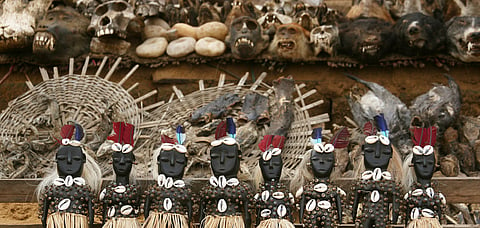
- Destinations
- Experiences
- Stay
- What's new
- Celebrating People
- Responsible Tourism
- CampaignsCampaigns
- Subscribe
- Buy Now

Benin is widely regarded as the birthplace of West African Vodun, popularly known as voodoo. If you&rsquore travelling in or around the country on January 10, the one place you should visit is the town of Ouidah for the Fête du Vodoun, or the Ouidah Voodoo Festival. One of the largest tourist draws in Benin, it is a cultural fete organised by the Fon people, who are a major African ethnolinguistic group.
The Voodoo Festival is a public holiday celebrated all over the country, but Ouidah&rsquos processions are most well-known. It begins with the slaughter of a goat&mdashritualistic animal sacrifice is common in Vodun. The festival uses singing, dancing, processions and imbibing of alcohol to honour the history of the religion in West Africa. It also pays respect to those whose lives were destroyed by the slave trade. The chief priest or feticheur at Ouidah is Dagbo Houno, who presides over the festival. He kicks off the main procession after paying respects to fetishes at the Temple of Pythons. The procession takes the route on which slaves were transported from Benin to the west, and ends at Ouidah beach which overlooks the Atlantic Ocean. Various Vodun delegations arrive here to pay tribute to Dagbo and other powerful feticheurs. Visitors can spot ceremonial drums, traditional masks, colourful outfits and jewellery as part of the fete. Other common sights are zangbetos, vodun night watchmen whose outfits resemble haystacks, ritual animal sacrifices (they can be quite unsettling for foreign tourists), and worshippers dressed as clan spirits.
Vodun considers all of creation divine, which explains the use of herbal medicines and everday objects in rituals. A variety of talisman, known as &lsquofetishes&rsquo, are sold in some markets and are believed to hold spirits. The fetishes themselves may be statues or dried human/animal parts. The spirits within each fetish are believed to perform tasks according to their capacity. The hierarchy of the sacred ranges from vodun divinities who control nature, to the spirits of streams, trees and nature, to certain members of a clan, tribe or nation. Dialects, spirits, songs and rituals are used in patterns to pray to the gods, of whom Mawu&mdashdepicted as a gentle old woman&mdashis believed to be the divine Creator.
Vodun is practised by a majority in Benin, and is an official religion with 40 per cent of the population adhering to its traditions. Christian and Muslim communities also include some elements of the religion in their daily life. Since the Fon people also inhabit parts of Togo, Ghana and Nigeria, tour circuits often include trips to these neighbouring countries as part of the festival experience.
West African Vodun is far removed from the mystical&mdashand often negative&mdashidea of voodoo that cinema and pop culture have disseminated, especially the trope of sticking needles into dolls linked to human victims. The various traditions you will find in Benin were carried over to North America and Caribbean countries during the African slave trade, where a Creole form of voodoo, combining African, Caribbean, Catholic and Native American traditions, can be found today. To reaffirm the place of vodun in Benin&rsquos national identity after colonialism, Ouidah has held an International Vodun Conference every year since 1991.
